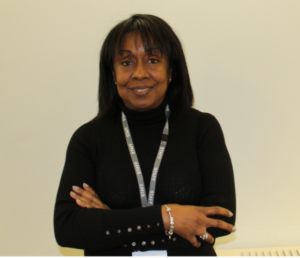Estephanie Dunn blog
Estephanie Dunn, Regional Director of Royal College of Nursing the North West, has been in her role since 2014, following a 45 year career as a registered nurse, midwife, health visitor, children’s nurse, lecturer, general manager and director of nursing. Estephanie shares a personal story for Black History Month. 
Throughout my life, from earliest childhood, I see the tremendous influence that many great, strong, capable and determined black women have had on my thoughts and actions.
My mother was a strong and industrious woman of faith. She steadfastly held the belief that challenges and adversity were there to be overcome – sitting and waiting was never going to make anything any better.
My father encouraged his daughters to achieve academically, socially and professionally in the same way that he encouraged his sons. Knowing how to wire a plug, put up a shelf and address basic DIY tasks was as important for me as learning how to cook, clean and do laundry was for the boys.
This sense of equity and refusing to define roles by gender suited me well. My paternal grandmother descended from the Carib Nation (American Indians), and she was strong and determined, refusing to be marginalised or thwarted.
I am a descendant of an enslaved man who was freed. I know that I would not be here without his physical and psychological resilience and that makes me proud.
Moving to England at the age of seven with these values hard-wired into my psyche, I saw no reason for me to acquiesce or become less because of another person’s view of, or expectations for me. I believed my parents when they said that I could do and be whatever I chose and not to limit myself. This was important, especially at a time when black and brown people were rarely, if ever, represented in the media or held positions of power. Women from diverse backgrounds were rarely seen during my early years and I remain thankful to the women in our family and friendship circles who gave me a different perspective, going on to achieve despite the myriad obstacles put in their way.
As a student nurse, I was privileged to work alongside more amazing black nurses, the majority forced to become enrolled nurses, stuck in a career cul-de-sac. They bore this injustice with a grace and dignity that I would struggle to command.
I could count on the fingers of one hand the number of black ward sisters I worked with, or even saw, in a large London teaching hospital. Together, this amazing group of black nurses supported and encouraged me to achieve, delighting in my becoming a registered nurse. I owe them so much.
More broadly, I grew to understand more about the ways in which black and brown women contributed to science, the arts, economics etc., and how often, and how unjustly, these achievements were airbrushed from history.
We must support each other and fight against plagiarism and theft of intellectual property. These raids on our talents and creativity stymy our career progression and limit financial gain. The smallest of ideas must be attributed to the originator and collectively we can make that happen.
I now have a much longer list of black and brown women who influence me, and I celebrate them all. That number will continue to grow, although it does, in part, rely upon our male allies to recognise and encourage more of our global majority women to take their rightful place on that list.
In so doing, we can ensure that girls like my seven-year-old self will have a wider and more varied community of female role models by whom they too can be influenced and inspired. It is within our grasp as long as we continue to ‘Salute our Sisters’ and lift them up high.
